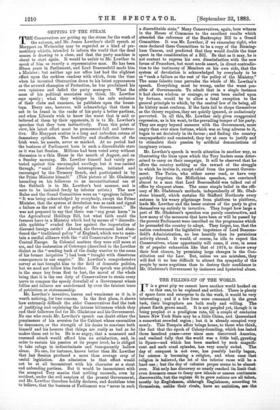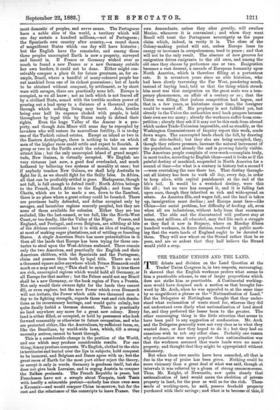THE FILLING-UP OF THE WORLD.
IT is a great pity we cannot have another world hooked on to this one, to be explored and settled. There is plenty of spare force and enterprise to do the work, it would be very interesting ; and if a few lives were consumed in the great task, their biographers are both ready and willing. The planet Earth grows small. It is not peopled yet, though it is being peopled at a prodigious rate, till a couple of centuries hence New York State may be a little China, and Queensland a somewhat crowded region ; but it is already occupied very nearly. This Tonquin affair brings home, to those who think, the fact that the epoch of Colony-founding, which has lasted three hundred years—ever since men discovered America, and realised fully that the world was a little ball, gyrating in Space—and which has been marked by such magnifi- cent and such cruel episodes, has very nearly ended. The day of conquest is not over, has possibly hardly begun, for science is becoming a religion, and when once that religion is believed, the lot of the inferior races will be a. hard one ; but the day of colonies proper seems to be almost over. Not only has discovery so nearly reached its limit that even dreamers cease to fancy new islands or unseen continents discoverable, but the regions fit to grow nations are all taken, mostly by Englishmen, although Englishmen, according to. themselves, unlike their rivals, have no ambition, are the
most domestic of peoples, and never annex. The Portuguese have a noble slice of the world, a territory which will one day sustain a hundred millions,—not of Portuguese ; the Spaniards own country after country,—a round dozen of magnificent States which one day will have histories ; but the English have the remainder, and among these three peoples unoccupied Earth is now a property, surveyed and fenced in. If France or Germany wished ever so much to found a new France or a new Germany outside her own borders, it could not be done. Either might con- ceivably conquer a place fit for future greatness, as, for ex- ample, Brazil, where a handful of many-coloured people bar out mankind from one of its richest possessions ; but of lands to be obtained without conquest, by settlement, or by short wars with savages, there are practically none left. Europe is occupied, as we all know ; not an inch which is not fenced off by a civilised State, armed with the terrible modern power of pouring out a lead spray to a distance of a thousand yards, through which nothing living may burst. Asia, besides being over half its expanse choked with people, is held throughout by legal title by States ready to defend their rights. Even the huge Valley of the Amour is a pro- perty, and though Asia Minor will some day be repeopled by invaders who will restore its marvellous fertility, it is to-day one of the Turkish ruined estates. Except an island or two in the Eastern Archipelago, there is nothing to take on which men of the higher races could settle and expect to flourish. A group or two in the Pacific await the colonist, but can never attract him ; but the only unoccupied island of grand magni- tude, New Guinea, is virtually occupied. We English are very virtuous just now, a good deal overloaded, and much bothered by believing two systems of morality at once; but if anybody touches New Guinea, we shall help Australia to fight for it, as we should fight for the Scilly Isles. In Africa, all that can be profitably settled is gone. Madagascar, though not full, is full enough to defend itself ; North Africa belongs to the French, South Africa to the English ; and from the Chotts, which are to be made a sea, down to the Zambesi, there is no place where a great colony could be founded. There are provinces badly defended, and deltas occupied only by savages, and lacustrine regions scarcely peopled, but they are none of them available for colonies. Either they are too secluded, like the last-named, or too full, like the North-West Coast, or too deadly, like the Valley of the Niger. France, and England, and Portugal, and even Belgium, are nibbling at bits of the African continent ; but it is with an idea of trading, or at most of making sugar plantations, not of settling or founding States. A single American State has more potentialities in it than all the lands that Europe has been trying for three cen- turies to steal upon the West-African seaboard. There remain only the two Americas, and practically the English and their American children, with the Spaniards and the Portuguese, claim and possess them both by legal title. There are not a thousand square miles anywhere which Prince Bismarck could mark on a map and say," This shall be mine." It is true there are rich, unoccupied regions which would hold all Germany, or all Europe for that matter ; but the Prince could not say Brazil shall be a new Germany, or the back region of Peru a Prussia. Not only would their owners fight for the lands they cannot fill, or even explore, but the new Power which even Bismarck will not irritate, the Power which adds two thousand men a day to its fighting strength, regards those vast and rich desola- tions as its reversionary heritage, and would quite calmly, but quite finally forbid a German descent. There is practically no land anywhere any more for a great new colony. Every land is either filled, or occupied, or held by possessors who look forward reasonably or otherwise to future occupation, and who are protected either, like the Australians, by sufficient force, or, like the Brazilians, by world-wide laws, which, till a strong necessity arrives, cannot be burst through. This is a considerable change in the position of the World, and one which may produce considerable results. For one thing, it may produce conquests. We English, clothed to the chin in territories and buried over the lips in subjects, hold conquest to be immoral, and Belgians and Danes agree with us; but the great races of Earth for the most part either reject the theory, or accept it only in words. Germany is goodness itself, but she does not give back Lorraine, and is urging Austria to conquer the Balkan peninsula. The French Republic is peace, bat Frenchmen have not a scruple about Tonquin, took Timis with hardly a oolourable pretext--nobody has since even seen a Kroumir—and would conquer China to-morrow, but for the cost and the reluctance of the conscripts to leave France. Our own descendants, unless they alter greatly, will swallow Mexico, whenever it is convenient ; and when they want Brazil will treat the Portuguese sovereignty as the paper
claim which, indeed, in verity it is. The close of the Colony-making period will not, unless Europe loses its energy or increases in scrupulousness, tend to peace ; and that will not be the only result. The absence of new grooves for emigration drives emigrants to the old ones, and among the old ones they choose by preference one or two. Emigration becomes a vast descent, a cascade of European humanity upon North America, which is therefore filling at a portentous rate. It is seventeen years since an able historian, who had been slowly traversing the Far West, pondering much, instead of buying land, told us that the thing which struck him most was that emigration on the great scale was a tem- porary phenomenon, an affair of a century or so ; that the Union was filling, that jealous competition had begun, and that in a few years, as historians count time, the foreigner would be warned off. His prophecy is not fulfilled yet, but already in the Union the authorities send back paupers because their own are too many ; already the workmen suffer from com- petition ; already they ask if it may not be this rush from abroad which makes Trade-Unionism impossible, and so steadily, as the Washington Commissioners of Inquiry report this week, sends down wages. The unoccupied lands check the fall, by drawing off the able-bodied ; but they also are being occupied, they, though they relieve pressure, increase the natural increment of the population, and already the end is growing faintly visible. The American people complain of over-work—complain truly, in most trades, according to English ideas—and it looks as if the painful destiny of mankind, suspended in North America for a second of time—for what is a century in history but a second ? —were overtaking the race there too. That destiny through- out all history has been to work all day, every day, in order to keep alive, with capital punishment at the end of the
life's toil. It would be a wretched destiny, were this life all ; but no race has escaped it, and it is falling fast upon ours, though they inherited so rich and wide-spread an estate. As America fills, and wages fall, and the land is taken up, immigration must decline ; and Europe must face—like China—her social problem, her difficulty of feeding all, even when all are industrious, without help from that enormous relief. The able and the discontented will perforce stay at home, and millions, all educated, may find life such a struggle as they find it now in Stepney, where on Monday fifteen hundred workmen, in fierce distress, resolved in public meet- ing that the waste lands of England ought to be devoted to them. They will sow wheat on the Strand rather than be so poor, and are so ardent that they half believe the Strand would yield a crop.



































 Previous page
Previous page